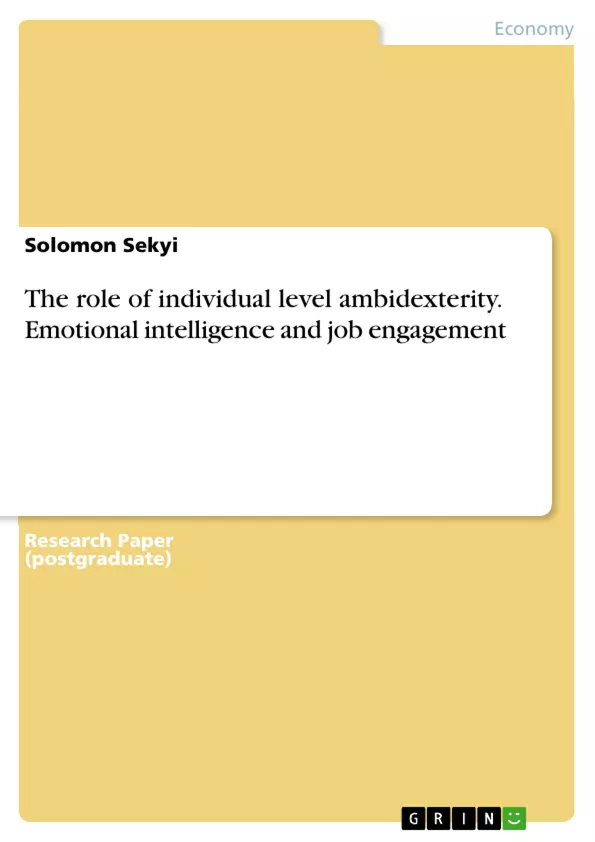This study aimed to examine emotional intelligence and employees’ work engagement: the mediating role of individual level ambidexterity. Employees’ sense of engagement to their jobs has in recent times become very crucial to both academics and practitioners. The significance of human beings in an organization is embedded in the knowledge, skills and abilities possessed by employees. Although ones’ intellectual ability may predict their successful contribution to organizations in which they find themselves, a very important aspect which is mostly overlooked by employer is individual awareness of their emotions and how they can tactfully handle emotion-related matters.
The researcher adopted a descriptive cross-sectional survey using structured questionnaires to collect data from the study respondents. The data was collected from a total of 351 respondents from the Local Government Service and these respondents were sampled using the convenient sampling procedure. Linear regression analysis was used to analyze the impact of the independent variable on the dependent variable. Hayes mediation analysis with confidence intervals was used to test the mediation of individual ambidexterity.
Inhaltsverzeichnis (Table of Contents)
- CHAPTER ONE
- INTRODUCTION
- 1.1 Background of the Study
- 1.2 Statement of Problem
- 1.3 Research Objectives
- 1.3.1 Main Objective of the Study
- 1.3.2Specific objectives
- 1.4 Research Questions
- 1.5 Significance of the Study
- 1.6 Brief Overview of the Methodology
- 1.7 Scope of the Study
- 1.8 Limitations of the study
- 1.9. Organization of the Study
- CHAPTER TWO
- LITERATURE REVIEW
- 2.1 Introduction
- 2.2 Definition of key concepts related to the topic of the thesis
- 2.2.1 Emotional intelligence
- 2.2.2 Background to the development of emotional intelligence
- 2.2.3 Concepts of emotional intelligence
- 2.2.4 The impacts and benefits of emotional intelligence
- 2.2.5 Emotional intelligence and Competencies
- 2.2.6 Developing Emotional intelligence
- 2.2.7 Measuring Emotional Intelligent
- 2.3 Work Engagement
- 2.3.1 Types of Employees
- 2.3.2 Components of work engagement
- 2.3.3 Human Resource practice to help employee engagement
- 2.4 Measurement of employee engagement using the Utrecht Work Engagement Scale
- 2.4.1 Ambidexterity
- 2.4.2 Organizational ambidexterity
- 2.4.3 Individual level Ambidexterity
- 2.5 Theoretical Review
Zielsetzung und Themenschwerpunkte (Objectives and Key Themes)
This research investigates the relationship between emotional intelligence and employee work engagement, specifically examining the mediating role of individual-level ambidexterity. It aims to understand how emotional intelligence influences employee engagement and how ambidexterity facilitates this connection.
- The impact of emotional intelligence on employee work engagement.
- The role of individual-level ambidexterity in mediating the relationship between emotional intelligence and work engagement.
- The importance of developing emotional intelligence in employees to enhance work engagement.
- Practical strategies for organizations to foster employee engagement by promoting emotional intelligence.
- The contribution of individual-level ambidexterity to organizational effectiveness and employee well-being.
Zusammenfassung der Kapitel (Chapter Summaries)
Chapter One introduces the research topic and presents a background on the importance of employee engagement in modern organizations. It outlines the research problem, objectives, questions, and significance, as well as the study's methodology, scope, limitations, and organization.
Chapter Two delves into a comprehensive review of existing literature relevant to the research. It provides definitions of key concepts such as emotional intelligence, work engagement, and ambidexterity, examining their development, components, benefits, and measurement. The chapter also explores theoretical frameworks underpinning the research.
Schlüsselwörter (Keywords)
The core keywords and focus topics of this research include emotional intelligence, work engagement, individual-level ambidexterity, organizational ambidexterity, human resource practices, employee engagement, and organizational effectiveness.
Frequently Asked Questions
What is the relationship between emotional intelligence and work engagement?
The study examines how an individual's awareness and management of emotions positively impact their sense of commitment and engagement toward their job.
What role does individual-level ambidexterity play in this study?
Individual ambidexterity acts as a mediator, meaning it helps explain the mechanism through which emotional intelligence leads to higher work engagement.
How was the data for this research collected?
The researcher used a descriptive cross-sectional survey with structured questionnaires, sampling 351 respondents from the Local Government Service.
What is the Utrecht Work Engagement Scale?
It is a validated tool used in the study to measure the components of employee engagement within the organization.
Why is emotional intelligence often overlooked by employers?
While intellectual ability is often prioritized, the study argues that emotional awareness is a crucial but frequently ignored predictor of successful organizational contribution.
- Quote paper
- Solomon Sekyi (Author), 2023, The role of individual level ambidexterity. Emotional intelligence and job engagement, Munich, GRIN Verlag, https://www.grin.com/document/1319572



